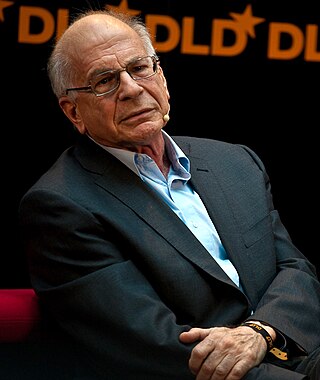The term Homo economicus, or economic man, is the portrayal of humans as agents who are consistently rational and narrowly self-interested, and who pursue their subjectively defined ends optimally. It is a wordplay on Homo sapiens, used in some economic theories and in pedagogy.

Daniel Kahneman was an Israeli-American psychologist best known for his work on the psychology of judgment and decision-making as well as behavioral economics, for which he was awarded the 2002 Nobel Memorial Prize in Economic Sciences together with Vernon L. Smith. Kahneman's published empirical findings challenge the assumption of human rationality prevailing in modern economic theory. Kahneman became known as the "grandfather of behavioral economics."

Behavioral economics is the study of the psychological factors involved in the decisions of individuals or institutions, and how these decisions deviate from those implied by traditional economic theory.

Cass Robert Sunstein is an American legal scholar known for his work in constitutional law, administrative law, environmental law, and behavioral economics. He is also The New York Times best-selling author of The World According to Star Wars (2016) and Nudge (2008). He was the administrator of the White House Office of Information and Regulatory Affairs in the Obama administration from 2009 to 2012.

Institutional economics focuses on understanding the role of the evolutionary process and the role of institutions in shaping economic behavior. Its original focus lay in Thorstein Veblen's instinct-oriented dichotomy between technology on the one side and the "ceremonial" sphere of society on the other. Its name and core elements trace back to a 1919 American Economic Review article by Walton H. Hamilton. Institutional economics emphasizes a broader study of institutions and views markets as a result of the complex interaction of these various institutions. The earlier tradition continues today as a leading heterodox approach to economics.

Richard H. Thaler is an American economist and the Charles R. Walgreen Distinguished Service Professor of Behavioral Science and Economics at the University of Chicago Booth School of Business. In 2015, Thaler was president of the American Economic Association.

Robert Harris Frank is the Henrietta Johnson Louis Professor of Management Emeritus and a professor of economics at the Samuel Curtis Johnson Graduate School of Management at Cornell University. He contributes to the "Economic View" column, which appears every fifth Sunday in The New York Times. Frank has published on the topic of wealth inequality in the United States.

Libertarian paternalism is the idea that it is both possible and legitimate for private and public institutions to affect behavior while also respecting freedom of choice, as well as the implementation of that idea. The term was coined by behavioral economist Richard Thaler and legal scholar Cass Sunstein in a 2003 article in the American Economic Review. The authors further elaborated upon their ideas in a more in-depth article published in the University of Chicago Law Review that same year. They propose that libertarian paternalism is paternalism in the sense that "it tries to influence choices in a way that will make choosers better off, as judged by themselves" ; note and consider, the concept paternalism specifically requires a restriction of choice. It is libertarian in the sense that it aims to ensure that "people should be free to opt out of specified arrangements if they choose to do so". The possibility to opt out is said to "preserve freedom of choice". Thaler and Sunstein published Nudge, a book-length defense of this political doctrine, in 2008.
Hersh Shefrin is a Canadian economist best known for his pioneering work in behavioral finance.

Herbert Gintis was an American economist, behavioral scientist, and educator known for his theoretical contributions to sociobiology, especially altruism, cooperation, epistemic game theory, gene-culture coevolution, efficiency wages, strong reciprocity, and human capital theory. Throughout his career, he worked extensively with economist Samuel Bowles. Their landmark book, Schooling in Capitalist America, had multiple editions in five languages since it was first published in 1976. Their book, A Cooperative Species: Human Reciprocity and its Evolution was published by Princeton University Press in 2011.

Thomas W. Hazlett is the Hugh H. Macaulay Endowed Professor of Economics in the John E. Walker Department of Economics at Clemson University where he also directs the Information Economy Project.

Nudge: Improving Decisions about Health, Wealth, and Happiness is a book written by University of Chicago economist and Nobel laureate Richard H. Thaler, and Harvard Law School professor Cass R. Sunstein, first published in 2008. In 2021, a revised edition was released, subtitled The Final Edition.
George W. Ainslie is an American psychiatrist, psychologist and behavioral economist. He is chief Psychiatrist at the Veterans Affairs Medical Center in Coatesville, Pennsylvania and Clinical Professor of Psychiatry at Temple University School of Medicine.
Mathiness is a term coined by Nobel Prize-winning economist Paul Romer to label a specific misuse of mathematics in economic analyses. An author committed to the norms of science should use mathematical reasoning to clarify their analyses. By contrast, "mathiness" is not intended to clarify, but instead to mislead. According to Romer, some researchers use unrealistic assumptions and strained interpretations of their results in order to push an ideological agenda, and use a smokescreen of fancy mathematics to disguise their intentions.
Shlomo Benartzi is an American behavioral economist, known for his research on retirement savings and the Save More Tomorrow nudge. Benartzi is a Professor Emeritus at the UCLA Anderson School of Management in Los Angeles, California.
Misbehaving may refer to:
Henrik Cronqvist is the Robert J. and Carolyn A. Waltos Dean and Professor of Economics of the George L. Argyros School of Business and Economics at Chapman University in Orange, California, a position he has held since August 2022. Since taking over the role, significant staff turnover has occurred. He previously served as a professor of finance, Bank of America scholar, and vice dean for faculty and research at the University of Miami School of Business, where he conducted interdisciplinary research and taught finance and management courses at both undergraduate and graduate levels.
Robin Miles Hogarth was a British-American psychologist and emeritus professor in the Department of Economics and Business at Universitat Pompeu Fabra in Barcelona, Spain. He served as president of both the Society for Judgment and Decision Making and the European Association for Decision Making. His previous positions include ICREA Research Professor at Universitat Pompeu Fabra and Wallace W. Booth Professor of Behavioral Science at the University of Chicago.
Guido Baltussen is a Dutch economist who is professor in Behavioral Finance at Erasmus University Rotterdam and Head of Factor Investing and co-head of Quant Fixed Income at Robeco Asset Management.









